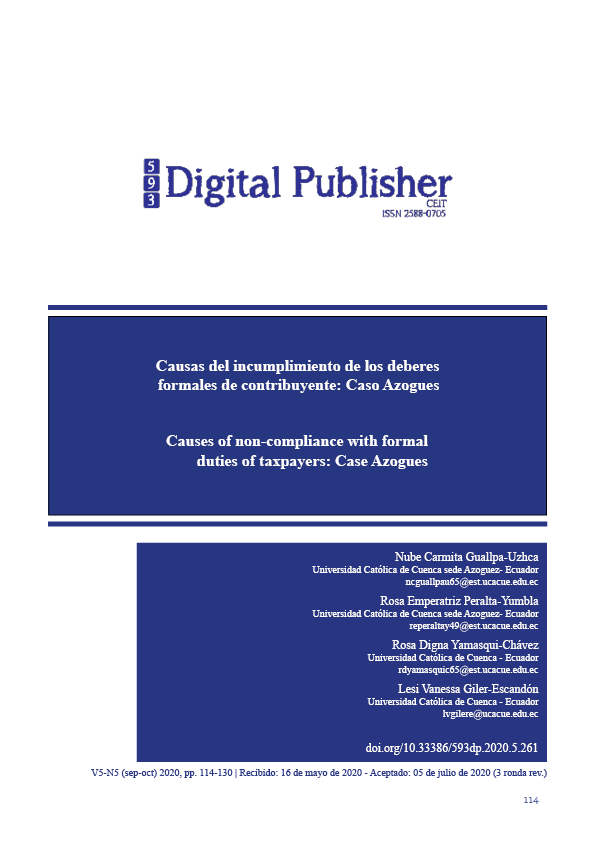Causes of non-compliance with formal duties of taxpayers: Case Azogues
Main Article Content
Abstract
Currently, the lack of compliance with formal duties is part of the habitual procedure of taxpayers, due to the lack of values and fiscal citizenship, the search for higher profits and the increase in informal traders. The objective of this work is to detect the compliance of the formal duties of taxpayers and the sanctions received, this information constitutes a starting line on the persecution that the experts have and the reality detected in the study group, about the degree of compliance, the expert´s perception with respect to what is expressed by taxpayers and the reasons for not fulfilling the duties that you have as a taxpayer. Where the researcher's analyzes primary source data, taken on one occasion and of a descriptive cut, for this purpose a bibliographic around the subject of the study, interviews with experts and surveys of taxpayers were applied.
The results are tabulated show information regarding received by the taxpayers, determining that ona of the major infractions is due to the lack of issuance of sales receipts, concluding that and the level of formal instruction does not influence compliance capacity, that the tax culture in spite of the great efforts made and resources allocated by the Tax Administration, still needs to be encouraged, and greater control should be exercised in the different rural and urban parishes and mechanisms and technologies that support voluntary compliance.
Downloads
Article Details
1. Derechos de autor
Las obras que se publican en 593 Digital Publisher CEIT están sujetas a los siguientes términos:
1.1. 593 Digital Publisher CEIT, conserva los derechos patrimoniales (copyright) de las obras publicadas, favorece y permite la reutilización de las mismas bajo la licencia Licencia Creative Commons 4.0 de Reconocimiento-NoComercial-CompartirIgual 4.0, por lo cual se pueden copiar, usar, difundir, transmitir y exponer públicamente, siempre que:
1.1.a. Se cite la autoría y fuente original de su publicación (revista, editorial, URL).
1.1.b. No se usen para fines comerciales u onerosos.
1.1.c. Se mencione la existencia y especificaciones de esta licencia de uso.
References
Acuña, M. E., & Villegas, A. J. (2009). La relación entre Imagen mental, conceptualización y pensamiento creativo en el Diseño Gráfico. Revista Digital Universitaria. Volumen 10 Número 12.
Almeida Filho, N. d., Castiel, L. D., & Ayres, J. R. (2009). Riesgo: concepto básico de la epidemiología. Salud Colectiva, vol. 5, núm. 3, pp. 323-344.
Armas, E., & Colmenares, M. (2009). Educacion para el desarrollo de cultura tributaria. Universidad Rafael Belloso Chacin(6), 141-160.
Asamblea Nacional. (2018). Código Tributario. Quito: Lexisfinder.
Bolaños, L. d. (2016). Justicia tributaria como principio constitucional en el Estado social de derecho. Revista de Derecho.
Buendia, P., León, A., & Ruiz, O. (2017). Medición del riesgo tributario en la transferencia de las empresas mineras en el Perú. Lima.
Cusme, Y. (2018). La evasión Tributaria y su incidencia en la economía del Ecuador 2010 - 2014. QUIPUKAMAYOC, 26(50), 13-21. doi:http://dx.doi.org/10.15381/quipu.v26i50.14721
Escalante , P., & Hulett, N. (2009). Los deberes formales a cumplir por las personas naturales como contribuyentes del impuesto al valor agregado. Actualidad Contable Faces, 12(18), 34-43. Obtenido de https://www.redalyc.org/pdf/257/25712300004.pdf
Escalante, P., & Hulett, N. L. (2009). Los deberes formales a cumplir por las personas naturales como contribuyentes del impuesto al valor agregado. Actualidad Contable Faces, 12(18), 34-43. Obtenido de https://www.redalyc.org/pdf/257/25712300004.pdf
Garcia Centeno, D., Narváez Zurita, I., Giler, L., & Erazo, J. (2019). Planificación tributaria como herramienta mitigadora de riesgos fiscales en la industria camaronera. Visionario Digital, 3, 550-576. doi:https://doi.org/10.33262/visionariodigital.v3i2.1..588
González, C. M. (08 de Septiembre de 2016). Revista educarnos. Obtenido de Revista educarnos: https://revistaeducarnos.com/que-es-eso-de-conceptualizar/
González, M. S., & Gaspar, I. G. (2016). La cultura tributaria en la sociedad cubana: un problema a resolver. Scielo.
Hidalgo, I. (2015). Estudio sobre el riesgo tributario en Ecuador y su relación con la fiscalidad internacional, peridodo 2010 – 2014. Guayaquil: Universidad de Guayquil Facultad de Ciencias Económicas.
Hidalgo, R. E. (2014). El domicilio tributario: garantías y consecuencias jurídicas. Negotium, 10.
Mestas, F. K. (2017). Nivel de cultura tributaria y su incidencia en el cumplimineto de las obligaciones tributarias de los comerciantes del mercado internacional 24 de octubre de la ciudad de Juliaca periodo 2015. Puno: Universidad Nacional Del Altiplano.
Ministerio de Educación. (2013). Ecuador: Indicadores Educativos 2011 - 2012. Quito: Ministerio de Educación del Ecuador.
Morón Vásquez, A. J., Reyes Matheus, M. M., & Antonio, U. C. (2015). Gestión de riesgos en la empresa R.C. Agelvis, C.A. Multiciencias, vol. 15, núm. 4, pp. 417-427.
Palacios, R. E. (2016). Indicadores de responsabilidad tributaria en las fundaciones acogidas a la Ley 49/2002. CIRIEC-España, Revista de Economía Pública, Social y Cooperativa,, 126-12,63.
Pérez, J. (2006). Mnejo del ambiente y riesgos ambientales en la region fresera del Estado de México.
Rios, G. (2005). Las infracciones tributarias en el sistema tributario mexicano. Boletín Mexicano de Derecho Comparado, 23.
Rodríguez, D. M. (04 de 05 de 2009). Alcance y efectos de la introducción del principio de progresividad en sistema constitucional tributario ecuatoriano, a partir de la Constitución del 2008. Quito, Ecuador.
Servicio de Rentas Internas. (2018). Mi guía Tributaria: Deberes Formales. Quito: SRI. Obtenido de https://www.sri.gob.ec/DocumentosAlfrescoPortlet/descargar/9f6d595e-3547-41a8-9a24-825561b81d73/Gu%C3%ADa%20Tributaria%201%20-%20Deberes%20formales%20(personas%20naturales%20no%20obligadas%20a%20llevar%20contabilidad).pdf
Solis, D. (2017). Hacia una definición del concepto grupo de interés. Perfiles latinoamericanos, 25(50), 83-101. doi:http://dx.doi.org/10.18504/pl2550-005-2017
Solís, E. (2015). Infracciones y Sanciones Tributarias. Tax Violations and Penalties, 329-370.
SRI. (2019). https://www.sri.gob.ec/web/guest/home. Obtenido de https://www.sri.gob.ec/web/guest/home
SRI. (2019). sri.gob.ec/web/guest/home. Obtenido de https://www.sri.gob.ec/web/guest/home
SRI. (31 de mayo de 2020). Estadísticas generales de recaudación periodo actual: SRI. Obtenido de SRI: https://www.sri.gob.ec/web/guest/estadisticas-generales-de-recaudacion-sri
SRI. (16 de 01 de 2020). Saiku next generation open source analytics: SRI en línea. Obtenido de SRI en línea: https://srienlinea.sri.gob.ec/saiku-ui/
Tamayo, A. A. (2007). Estrategias de aprendizaje y comunicación. Bogotá: Universidad Cooperativa de Colombia.
Tocabens, B. E. (2011). Definiciones acerca del riesgo y sus implicaciones. Scielo, 470-481 .
Villagómez, M. (2011). Etica y Cultura Tributaria en el Contribuyente. Revista Daena: International Journal of Good Conscience, 58-59.





